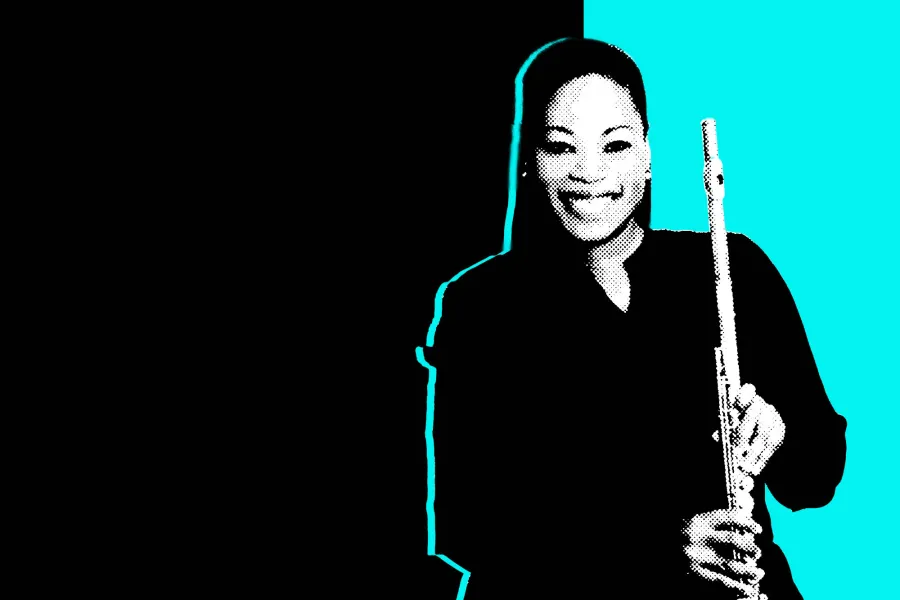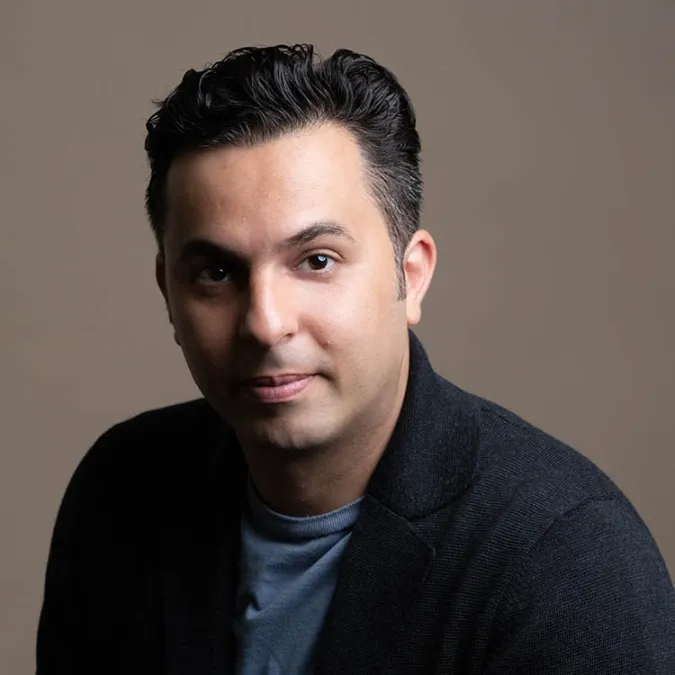
Farkhad Khudyev, conductor
Ebonee Thomas, flute
This concert will last about 90 minutes without intermission.
Please silence your electronic devices.
Photography, video, or recording of any part of this performance is prohibited
Program
John Corigliano
Voyage (version for flute and string orchestra)
Ebonee Thomas, flute
Sergei Rachmaninoff
Symphony No. 2 in E Minor, Op. 27
Largo – Allegro moderato
Allegro molto
Adagio
Allegro vivace
About the Program
Program notes by Mark Bilyeu
John Corigliano
Voyage
Born February 16, 1938, New York City, New York
Composed 1983
Premiered November 22, 1983, James Galway, flute, with the London Symphony Orchestra, Myung-Whun Chung, conductor; London, UK
Duration 9 minutes
John Corigliano continues to add to one of the richest, most unusual, and most widely celebrated bodies of work any composer has created over the last forty years. His scores, now numbering over one hundred, have won the Pulitzer Prize, the Grawemeyer Award, five Grammy Awards, an Academy Award, and have been performed and recorded by many of the most prominent orchestras, soloists, and chamber musicians in the world. Voyage for flute and string orchestra (1983) is an instrumental version of a 1971 a cappella choral work that was a setting of Richard Wilbur's translation of Baudelaire's famous L'Invitation au voyage. Wilbur's poignant setting pictures a world of obsessive imagination — a drugged version of heaven full of sensual imagery. The music echoes the quality of the repeated refrain found in this lush translation: "There, there is nothing else but grace and measure, richness, quietness and pleasure."
Sergei Rachmaninoff
Symphony No. 2 in E Minor, Op. 27
Born April 1, 1873, Starorussky Uyezd
Died March 28, 1943, Beverly Hills, CA
Composed 1906-1907
Premiered January 26, 1908, Mariinsky Theatre, Saint Petersburg, Russia
Duration 1 hour
Rachmaninoff’s first symphony was...how does one say it?...a total flop. Multiple factors collided to make the premiere of the work—now seen largely as an excellent example of Russia’s symphony tradition—an absolute disaster (it is never a good omen when the conductor says to the composer “Forgive me, but I do not find this music at all agreeable”). The work’s public failure sent the composer into one of the most storied talespins of classical music, leaving Rachmaninoff unsure if he should ever compose again. It took him several years, but the tall, gaunt composer was soon back on his feet with his wildly successful Piano Concerto in C Minor. Several years later, overwhelmed by all the publicity and requests to perform his own music, and finding no time to compose, Rachmaninoff moved his family to Dresden. He began composing immediately, churching out his First Piano Sonata; a set of songs; his symphonic poem The Isle of the Dead, and…another symphony.
His second symphony expands from a seven-note motto theme first uttered by the cellos and basses. As it unfolds, it seems that the composer falls more in love with his own theme, giving it new life as it is passed throughout the orchestra. The second movement—a scherzo in an unusual 2/2 time—is announced with four unison horns who pass the melody off to the violins, who promptly hand it right back. If you listen closely, you can hear the Dies Irae plainchant in the horns before it is announced by the full brass section in the recap.
The third movement oozes schmaltz—in the best way possible—and exudes a luxurious warmth that your whole body wants to simply absorb. (If parts of this movement are familiar to you, perhaps it is because the pop singer Eric Carmen grifted chucks of this for the 1976 hit “Never Gonna Fall in Love Again,” a choice which forced him to pay royalties to the Rachmaninoff estate, as it was still in copyright.) The final movement is a rollicking tarantella, which is quickly overcome by a rather unsettling march. Previous themes reappear from prior movements, including that original seven-note opening theme, before the tarantella comes back, barrelling towards the symphony’s exuberant conclusion.
About the Artists
Ebonee Thomas

Thomas is the Second Flute and Piccolo for The Dallas Opera, and has previously served as Principal Flute of the Knoxville Symphony, Principal Flute of the Florida Grand Opera, and Second Flute of the Houston Symphony. She spends her summers as a flutist with the Central City Opera in Colorado, and has been guest principal with symphonies and operas across the country. A passionate pedagogue, Thomas served as a member of the board of the Greater Dallas Youth Orchestras and is on the National Advisory Board of the Memphis Youth Symphony Program. She is also currently the Piccolo Committee Chair for the National Flute Association. An avid chamber musician, Thomas has worked with the Austin Chamber Music Society and Voices of Change, a new music ensemble in Dallas. She was a finalist for the Austin Arts Awards for her performance of Valerie Coleman’s Danza de la Mariposa. She recently made her debut performance with the ensembleNEWSRQ, a contemporary ensemble highlighting living and underrepresented composers.
Farkhad Khudyev

Farkhad Khudyev is the winner of the Gold Medal “Beethoven 250” at the 1st International Arthur Nikisch Conducting Competition; the Solti Foundation US 2018 and 2022 Career Assistance Award; the Best Interpretation Prize at the 1st International Taipei Conducting Competition; the 3rd prize at the 8th International Sir Georg Solti Conducting Competition; and the Gold Medal/Grand Prize at the 2007 National Fischoff Competition. Khudyev has worked with orchestras worldwide including the London Philharmonic Orchestra, Frankfurt Radio Symphony Orchestra, Frankfurt Opera Orchestra, Danish National Symphony Orchestra, Seattle Symphony, Dallas Symphony, Los Angeles Philharmonic, San Diego Symphony, Monterey Symphony, George Enescu Philharmonic Orchestra, Xi’an Symphony Orchestra and the State Taipei Chinese Orchestra. Farkhad was born in Turkmenistan, where he studied at the State Music School for gifted musicians, and then completed his studies at Interlochen Arts Academy, Oberlin Conservatory and Yale University. Khudyev serves as the Music Director of the University of Texas Symphony Orchestra in Austin, and the Orchestral Institute at the Hidden Valley Institute of the Arts in Carmel, California.
symphony orchestra
Violin I
Ellie Sievers, concertmaster
Yida An
Summer Bradshaw
Brandon Garza
Wells Gjerlow
Thomas Gougeon
Wai Shan Ma
Jimmy Shim
Sui Shimokawa
Misa Stanton
Qiyan Xing
Chloe Yofan
Lamu Zhaxi
Violin II
Mei Liu, principal
Ivan Arras
Noah Briones
Cade Carter
Georgia Halverson
Na-Yeon Kim
Peter Kim
Margaret King
Han Na Lee
Alice Pak
Suhaas Patil
Pedro Salas
Emma Thackeray
Tina Zhao
Yusong Zhao
Viola
Sheng-Chieh (Jason) Lan, principal
Gauri Binup
Ying-Chen Chen
Grace Dias
Nelle Joung
Harrison Knight
Anahit Matevosyan
Cecilia Nguyen
Dean Roberts
Alice Wei
Cello
Katsuaki Arakawa, principal
Rey Canales
Xinke Fu
William Han
Je-Shiuan Hsu
Aili Kangasniemi
Javy Liu
William Pu
Mika Syms
Christopher Tran
Tsz To Wong
Yilin Xu
Yochen Zhong
Double Bass
Juan Andres Hernandez Labra, principal
Shiying Feng
Darrin Luong
Justin McLaughlin
Eddie Otto
Will Penn
Kaitlyn Ruiter
Dublin Steding
Mirabai Weatherford
Xingchang Ye
Piccolo
Ji Soo Yoon
Flute
Riley Bender*
Gianna Baker
Ji Soo Yoon
Oboe
Nadia Para*
Caroline Ferguson
Julia Frank
English Horn
Julia Frank
Clarinet
Matt Rockwell*
Sadie Murray
Bass Clarinet
Raghav Vemuganti
Bassoon
Isabella Perez*
Mallory Mahoney
Horn
Lucas Hamilton*
Austin Waldbusser
Madeline Artman
Jenny Wu
Ben Cummings
Trumpet
Guillem Torró Senent*
Samuel Acosta
Colby Stone
Trombone
Arsene Bien-Aime*
Jace Byrd
Bass Trombone
Eric Garcia
Tuba
Ben McWilliams
Timpani
Michael Rivera-Gonazlez
Percussion
Matt Garica
Marcos Jurado
Ty Keller
Caroline Richards
Assistant Conductors
Chris Tran
Matthew Pavon
*principal for Rachmaninoff
Upcoming Events
University Orchestra
Free Admission
Tuesday, February 25, 7:30 pm
Bates Recital Hall
Symphony Orchestra
Featuring Donnie Ray Albert, baritone
Saturday, March 29, 2025, 7:30 pm
Bates Recital Hall
University Orchestra
Free Admission
Tuesday, April 22, 2025, 7:30 pm
Bates Rectial Hall
Symphony Orchestra
Concerto Competition Winners
Featuring 2 nights of unique programming
Saturday, April 26, 7:30 pm
Monday, April 28, 7:30 pm
Event Details
$5–15
All University of Texas at Austin students are allowed one free ticket as long as they are available. Student tickets must be picked up at the Box Office with valid student I.D. Seating is unassigned.
If you are a patron with ADA needs, please email tickets@mail.music.utexas.edu and we will reserve ADA seating for you.

